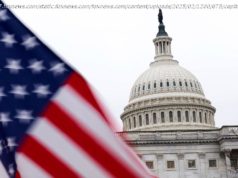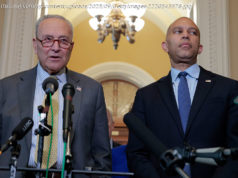Trump’s reality: 140 rough days in the books — 1,320 to go. If Thursday is any indication, rough days lie ahead.
The White House took comfort Thursday that former FBI Director James B. Comey did not directly accuse President Trump of trying to obstruct the bureau’s investigation into Russian interference in 2016 election.
Beyond that, bad news abounded. In a nationally televised Senate hearing, Comey repeatedly accused the president of lying and at least tacitly attempting to interfere.
No Republican senator openly contradicted him.
In what represented a showdown between Comey and the president, several members of his party, including the chairman of the Intelligence Committee that is investigating the role Russia played and whether anyone in the Trump campaign colluded, endorsed the truthfulness of the fired FBI director.
For a president mired in difficulties that are both political and legal, the hearing demonstrated a new and bracing shortage of avid support for Trump in the Senate.
Their reticence contrasted sharply with the message from the president’s personal lawyer, Marc Kasowitz, who told reporters after the public hearing that Comey had testified falsely, although Kasowitz’s remarks themselves included questionable statements.
The lawyer’s aggressive defense of Trump was the exception.
Some senators defended Trump gingerly, some indirectly. Others, like Florida Sen. Marco Rubio, a member of the Intelligence panel, chose equivocation. Asked if he could rule out the possibility that Trump obstructed justice, Rubio said:
“I’ m not prepared to reach a conclusion on that, because we’ re not done with all the other pieces that are missing.” Rubio said. He added that he did not know if Trump’s conduct “rises to criminality, ” but that Trump’s suggestion to Comey that he halt the investigation into former national security advisor Michael Flynn was not “appropriate.”
Other Republicans seem for now to have hit on an even more tepid justification for Trump’s actions — that he is a Washington naif who wandered into questionable territory due to unfamiliarity with the ways of the executive branch.
„The president’s new at this. He’s new to government, “ House Speaker Paul D. Ryan (R-Wis.) said at a briefing during the hearing.
Comey, by contrast, is anything but naïve, a fact he reinforced with his matter-of-fact recitation of pulling off the ultimate DC insider move — orchestrating the leak of his own memos in order to provoke the naming of a special counsel, effectively taking control of the probe away from Trump’s Department of Justice.
That move may have played into Trump’s characterization of himself as battling against a cabal of greater Washington, but the description by Comey drew little more than a shrug among the senators, even Republicans.
The limited willingness of senators of his own party to stand up for Trump shows how much the president is operating from a position of weakness.
Almost since the beginning of Trump’s presidential candidacy, most Americans —and a chunk of his own voters — have told pollsters that they believed he was untrustworthy. His remarks during his campaign and in his presidency have been replete with provable falsehoods, from erroneous statements about the size of his inauguration crowds to denials that he’s uttered words captured on video.
Trump’s aides have tried to brush off media attention to that credibility problem, but it appears to have taken a toll. Trump’s job approval, around 40% on average, is at or near the lowest point of his presidency and well below the ratings for most past presidents in their first terms.
And now, when he urgently needs members of his party to believe him, not his accuser, few, at least in the Senate, appear willing to vouch wholesale for Trump’s truthfulness as he heads into what seems likely to be a long summer and fall of special counsel investigations.
His support Thursday seemed to erode not because of any significant breakthrough but from the contrast between the president and the former FBI director.
Comey confirmed, in person and under oath, blockbuster news articles about the president’s actions. At the same time, he acknowledged the ambiguous nature of what he took to be Trump’s order to halt an investigation into former Trump advisor Flynn — the presidential action that seems closest so far to legal jeopardy.
As telling as anything: Republicans as well as Democrats seemed to take his assertions at face value. The strongest criticism leveled by either side centered on Comey’s decision not to confront Trump, especially in the White House meeting in February at which Trump allegedly asked for lenience for Flynn.
“ You’re big. You’re strong, ” Sen. Dianne Feinstein, the Democrat from California, asked. “Why didn’t you stop and say, ‘Mr. President, this is wrong. I cannot discuss this with you?’ ”
“It’s a great question, ” Comey replied. “Maybe if I were stronger, I would have. I was so stunned by the conversation that I just took it in.”
Since the president has denied the conversation took place, that line of critique by senators from both parties assumed that Comey’s version of events should be believed.
To side with Trump, Republicans would have to take up arms with a president who often contradicts his own aides’ carefully crafted defenses. They also would have to cast aside a long-time government attorney with a reputation for unflinching independence.
During the 2016 election, even as his agents were secretly investigating Trump’s campaign, Comey harshly criticized Hillary Clinton ’s actions in using a private email server. On Thursday, Comey criticized both current Atty. Gen. Sessions and Obama Administration Atty. Gen. Loretta Lynch, actions that together gave his statements more credibility, judging by the deferential statements of the Senate panel.
Republican Sen. James Risch of Idaho praised both Comey and the seven pages of prepared remarks about his interactions with Trump that were made public on Wednesday.
“America needs more like you, and we really appreciate it, ” he said. “Yesterday, I got, and everybody got, the seven pages of your direct testimony… I read it, then I read it again, and all I could think was, number one, how much I hated the class of legal writing when I was in law school. And you were the guy that probably got the A.”
Committee chairman Richard Burr opened by lauding Comey’s “candor” and closed by lauding his credibility as “somebody that loves this country enough to tell it like it is.
Start
United States
USA — mix Bad news for President Trump: Republicans aren't rushing to your defense






